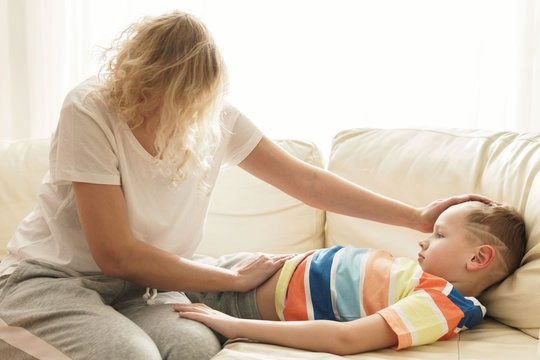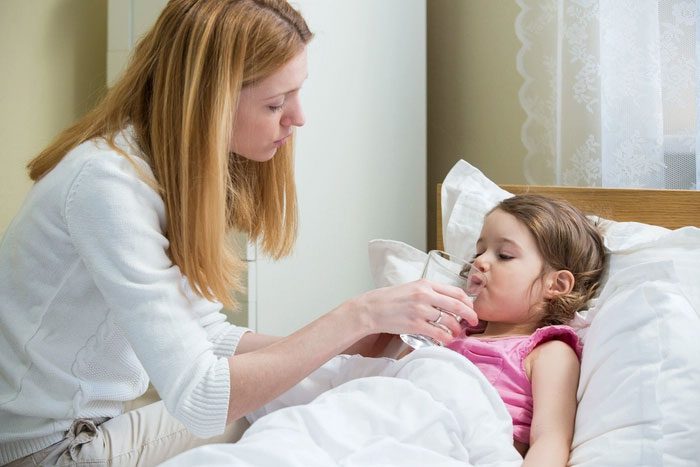Rotavirus is one of the most common causes of diarrhea in children worldwide. It is a type of virus that spreads through the gastrointestinal tract and causes symptoms such as diarrhea, nausea, vomiting, and abdominal pain.
Rotavirus is a virus that causes diarrhea and other gastrointestinal symptoms, primarily affecting children under the age of 5. Adults can also contract the virus, but symptoms are usually milder.
1. How to Identify Diarrhea Caused by Rotavirus
According to the Centers for Disease Control and Prevention (CDC), when infected with rotavirus, individuals exhibit symptoms such as diarrhea, fever, vomiting, and abdominal pain. Among these, severe diarrhea is the most common symptom of the infection. Sometimes, the characteristics of the stool in rotavirus diarrhea can be nonspecific and may be mistaken for diarrhea caused by other pathogens.
Therefore, to accurately diagnose diarrhea caused by rotavirus, individuals should visit a hospital for testing.
However, reports from the National Foundation for Infectious Diseases (NFID) indicate that diarrhea caused by rotavirus typically presents with watery green or brown stools, free of blood, and has a foul odor.
Additionally, symptoms of the illness usually begin approximately 48 hours after exposure to the rotavirus. Symptoms such as vomiting and diarrhea can last from 3 to 8 days.

Diarrhea is a common symptom of rotavirus infection. (Image: Internet).
2. How Does Rotavirus Affect Intestinal Motility?
Research indicates that rotavirus can cause gastrointestinal symptoms and affect intestinal motility by altering the structure and function of intestinal cells.
After ingestion, rotavirus travels to the small intestine and invades mature intestinal cells. These cells line the intestine and facilitate nutrient absorption. Within these mature intestinal cells, rotavirus replicates, affecting cellular activity.
According to a 2021 study, rotavirus can invade the small intestine, leading to cell death in the intestinal lining. This can result in several digestive symptoms, including watery diarrhea.
3. Is Diarrhea Caused by Rotavirus Dangerous?
A 2022 study found that severe dehydration caused by rotavirus can be a life-threatening complication for children. Therefore, parents and caregivers should be aware of dehydration symptoms in children, such as:
Lethargy, fatigue
- Severe thirst
- Dry mouth and throat
- Crying with little or no tears
- Decreased frequency of urination or fewer wet diapers in infants
If any of these symptoms occur, parents should take the child to the hospital for timely emergency care.

Children with rotavirus diarrhea can experience severe dehydration and life-threatening conditions. (Image: Internet).
4. How is Diarrhea Caused by Rotavirus Treated?
Currently, healthcare professionals do not have a standard treatment regimen for rotavirus. Rehydration and electrolyte replacement are the primary treatment methods, specifically:
- Drink plenty of fluids
- Supplement electrolytes as advised by a doctor. Note that electrolyte solutions should be used according to the recommended dosage, especially for children, to prevent electrolyte imbalances.
- Avoid sugary foods, fatty foods, or sugary fruit juices, as these can exacerbate diarrhea.
- Maintain a balanced diet rich in nutrients to improve the patient’s health.
Additionally, do not self-medicate with anti-diarrheal medications, especially for children under 18, as these may worsen conditions associated with infections such as Clostridium difficile or E. coli O157:H7. Therefore, no patient should receive anti-diarrheal medication without a confirmed cause of diarrhea and with symptoms such as recent antibiotic use, bloody diarrhea, hem-positive stools, or diarrhea accompanied by fever.

Rehydration and electrolyte replacement are the main treatment methods. (Image: Internet)
5. How to Prevent Diarrhea Caused by Rotavirus?
Rotavirus can spread when you touch the feces of an infected person or surfaces and objects contaminated with the virus, then touch your mouth. Therefore, to prevent diarrhea caused by rotavirus, individuals should:
- Wash hands frequently with soap, especially after using the restroom or changing a child’s diaper
- Disinfect surfaces in the home, including toys, doorknobs, and bathrooms…
- Avoid littering with used diapers
- Ensure full vaccination
In general, individuals with diarrhea caused by rotavirus can recover quickly with appropriate treatment and care. However, it is crucial to prevent patients, especially children, from becoming dehydrated. This can severely impact health and even pose a threat to life. When a patient has a high fever, prolonged diarrhea, or severe dehydration, they need to be taken to a healthcare facility for timely emergency care.




















































